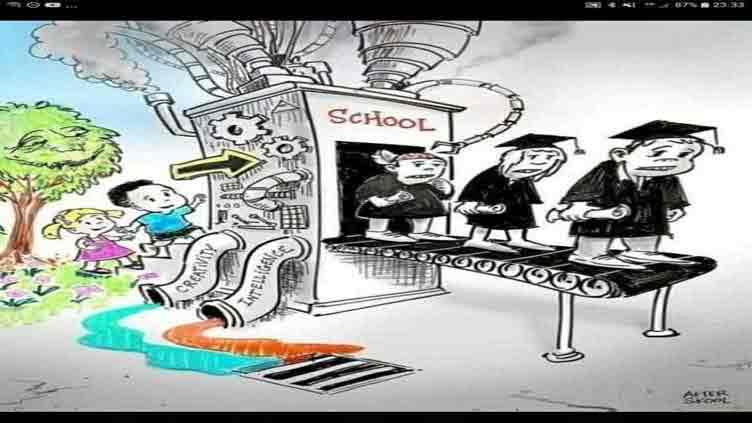Fix or Flop? An overview of educational dilemma

Pakistan
Instead of selling out schools, government may outsource examination system: Experts opine
By Javed Iqbal
Article 25-A of the Constitution of Pakistan states that "The State shall provide free and compulsory education to all children of the age of five to sixteen years in such manner as may be determined by law."
Article 37-b states “Remove illiteracy and provide free and compulsory secondary education within the minimum possible period.”
Under the constitutional umbrella, it is the responsibility of public schools, not private institutions, to ensure the education of our children.
However, in a bold yet contentious move, the Punjab government accomplished the outsourcing of over 14,000 public sector schools in the first phase of its privatisation plan. With a crumbling education system at stake, questions are being raised about whether privatisation is a viable solution or merely an attempt to shift the blame from decades of governmental neglect.
The government claims to spend around Rs550 billion annually on school education, supplemented by foreign grants. Yet, public education continues to deteriorate. The question that lingers is: who is responsible for this colossal failure?
Educationists and Teachers Sound the Alarm
Many educationists and teachers argue that outsourcing schools is not the answer. Professor Muhammad Ali, an education expert, points out, "Instead of addressing the root causes of failure, the government is taking an easy way out by privatising schools."
Teachers are even more vocal in their criticism. Muhammad Amin, a public school teacher, questions the role of the education department: "If the education system failed, who was overseeing it for decades? Blaming teachers is convenient, but the real accountability lies with the administrators and policymakers who have ignored the sector for years."

Parents Question the Move
Parents, too, are skeptical about the privatisation plan. Saima Malik, a mother of three, is worried about the long-term implications: "We’re hearing that private parties hire underqualified teachers for as low as Rs 5000 to Rs 10,000 a month. How will this ensure quality education for our children? If the government cannot manage education, how can we trust private entities to do better?"
System errors (SIS)
Several public sector schools, including those in Toba Tek Singh, were outsourced despite having more students and teachers than required by the government's criteria for outsourcing. This move violated the government's own privatisation policy, largely due to the department's failure to properly update the data, resulting in administrative errors and policy breaches.
Government’s Response
A senior official from the Punjab Education Department, as the secretary was not available, seeking anonymity, had a starkly different view. Teachers themselves are largely responsible for the failure of public education.
"Many teachers are more focused on running private tuition centres and academies than on their jobs in public schools," he blamed. "We have tried every method to reform the system internally. Outsourcing is a last resort, and the only way forward."
A History of Mismanagement
The truth, however, appears to be more complicated. Despite hefty budgets, education in Punjab has consistently failed to meet standards. District-level education authorities with high-paid Chief Executive Officers (CEOs) were established to bring reform, yet no significant improvements could be seen. Critics argue that corruption, mismanagement, and lack of accountability at the administrative level are the real culprits behind the system's collapse.

Educationist Muhammad Afzal remarked, "The problem lies in the central policies of the education department without consulting the teaching community. There has been no serious attempt to study the gaps and identify who or what is responsible for this failure. It’s not just the teachers; it’s the entire system."
Qudratullah, a policy analyst, asks, "Who will monitor these private parties once the schools are outsourced? If this is just a cost-cutting measure, then it’s destined to fail."
The Question of Accountability
One of the biggest criticisms of the privatization policy is the lack of accountability for those who oversaw the failing system. If teachers are to blame, as the government insists, then why have the education department authorities responsible for the sector’s oversight not been held accountable?
The Future of Public Sector Employment
Privatisation also poses a significant threat to employment in the education sector. Public schools have long been a major source of jobs for educated individuals in Punjab. Under privatization, there is concern that many teachers will lose their jobs, while others will face displacement issues.
Teachers Shun Their Own Schools
Parents across the province are pointing out a glaring contradiction. Public school teachers, who earn between Rs 50,000 and Rs 200,000 a month, are sending their children to private schools where teachers earn a fraction of their salary—sometimes as little as Rs 5,000. Huma Asghar, a concerned mother, voiced her frustration: “If the teachers themselves don’t trust the schools they work in, why should we? Why should I send my child to a public school when even the teachers are sending their kids elsewhere?”
Teachers’ Credibility Under Scrutiny
The role of public school teachers in this collapse is also under fire. While they earn impressive salaries compared to the private, many teachers are reportedly more focused on running private tuition centers or setting up their own private academies. Mrs Zahra Khan, a parent, questions their commitment: “How can a teacher be dedicated to their students in a public school when they are running private academies on the side?

This is why public education is falling apart, Mrs Khan asserted. She also desired authorities to draw a red circle around the teachers of the outsourced schools.
Dr Arshad Mahmood, a prominent educationist, stresses the need for a long-term plan: “The government keeps throwing money at the problem, but the system isn’t changing. We need a real vision that focuses on teacher training, curriculum development, and holding officials accountable. Otherwise, we’ll keep sinking billions into a broken system.”
A Broader Problem: Public Sector Decay
What’s happening in education is part of a larger issue affecting other public sectors—such as police, health, and revenue departments—that are also plagued by corruption and inefficiency. If education is being outsourced, what’s to stop the government from doing the same with other public services? Surprisingly, it is heard that the government besides establishing Price Control and Commodities Management Department, is also expanding the PHA and Dolphin force across the province.
Why Finland, Singapore have best education system?
Countries like Singapore and Finland have closed the gap between policy and classroom reality by empowering schools with greater autonomy. In contrast, struggling systems including Pakistan face large implementation gaps, where reforms fail to reach the everyday practices of teachers and students.

A Call for Reforms
Education reform is undeniably necessary, but many argue that privatization is not the answer. Munawar Ali, an educational consultant, proposes a different solution: "The government should first enforce policies that require all public officials, including those in the education department, to enroll their children in public schools. This would force the system to improve from within."
Outsource Examination System
Instead of selling out the infrastructure of the schools, the government may outsource the examination system, said former Vice Chancellor and presently HEC's Executive Director Dr Ziaul Qayyum. He said that instead of relying on many BISEs, Punjab Education Commission (PEC) etc, the government may sign a contract with the Cambridge exam system to conduct the examinations.

Initially, as a pilot project, only 10% of the best lot of the students can be registered to appear in such exams. Later, in coming years, the whole lot could be asked to appear in such exams. This, Dr Qayyum asserted, would not only address the public sector lethargy, rote learning issues, and number games but also deal with the academy and invigilator mafias.
Instead of arts, and humanities why not to promote technical education?
Taking the reform measure as a serious move the government should convert the arts and humanities to technical education even in the schools. This move will generate a lot of skilled workers instead of unskilled degree holders lot.
Paradigm shift (Conceptual larning)
Ending the culture of rote learning and marks-based competition in Pakistan's education system is crucial for fostering true intellectual growth. A shift towards concept-based learning is needed, where students are encouraged to understand, analyse, and apply knowledge rather than memorising information for exams. This approach will not only enhance critical thinking and problem-solving skills but also prepare students for real-world challenges. By focusing on comprehension and creativity, Pakistan can build a generation equipped to innovate and thrive in a knowledge-driven global economy.
The clock is ticking, and the consequences of inaction may be too big to ignore.


